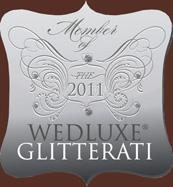Q&A
{ just an intimate affair…?}
Friday, May 4th, 2012 | etiquette, Q&A | No Comments
ORIGINALLY PUBLISHED IN THE CALGARY HERALD, MAY 2005, IN LISA HANSLIP’S COLUMN “I DO, BUT DON’T…”

Q: We chose a very small venue to have our reception and it was very difficult to get our guest list small enough. We all had to cut quite a few people we would love to be there – but it simply won’t accommodate any more people. A few of our friends (and our parents’ friends) are quite offended and upset about not being invited. How should we handle this?
A: When planning a wedding, making the guest list is frequently fraught with problems. The process of cutting down the guest list is, at best, the cause of making some hard choices, and at worst, absolutely agonizing. Most of the time it can be an emotional minefield for everyone:
• Mom, I don’t care if you envisioned my wedding having 400 guests – we only want 35.
• What do you mean you want to invite your ex-girlfriend?
• No Dad, I don’t want all 47 of my first cousins at the wedding.
• You mean I can’t invite 14 people from the office, what will I tell them?
You need to decide what is important – the venue or the number of guests. Have you always dreamed of an intimate wedding or is a huge bash more your style? If you have your heart set on a small wedding you have to be a little ruthless with the guest list.
If you’re having a wedding for 350 people – your friends have a right to be offended by their omission from the guest list – however, if you’ve chosen a venue that only holds 50 people – they should understand the size constraints – that you simply don’t have the option of including everyone. It is perfectly appropriate to host a wedding for just immediate family and a few close friends.
Remember a few things which should help before making the final decisions: Your wedding is not an opportunity for your parents to get payback for all the wedding gifts they’ve given and weddings they’ve attended over the years. It is also decidedly not an occasion for them to fulfill their social obligations (nothing makes a bride feel more special on her wedding day than a room full of her father’s business associates). It is also not appropriate to send invitations to a bunch of people you know will not be able to attend – it looks like a blatant plea for gifts.
In an ideal world, you could have your ideal wedding and everyone you’ve ever met could be invited – but unless heisting a Brinks truck is in your immediate future – your friends and family need to be understanding of the type of wedding you and your fiancé have chosen.
{ man of honour…or…how to have a guy as your bridesmaid }
Friday, April 27th, 2012 | etiquette, media, Q&A | No Comments
I know I’ve already blogged about having male bridesmaids and honour attendants of the opposite sex – but as it is a topic that comes up time and again with clients I thought it bears repeating. I think my first experience with this was a female “best man” in the mid-nineties sometime. She wore a floor-length strapless black gown and looked just lovely – and not even a little out of place – standing between the groom and the groomsmen.
I feel very strongly that you have the person or persons that mean most to you standing next to you while you get married – regardless of gender. You don’t need to have 4 attendants because your soon-to-be spouse is having 4 attendants. You don’t have to have them all in the same outfit (in fact, please don’t!!) – it’s great to infuse some character into your bridal party. And, you definitely don’t have to have female attendants because you’re the bride, nor male attendants because you’re the groom. We have had lots of “men of honour”s and “best women” over the years and it’s always perfectly appropriate – regardless if you’re having a religious or secular ceremony.
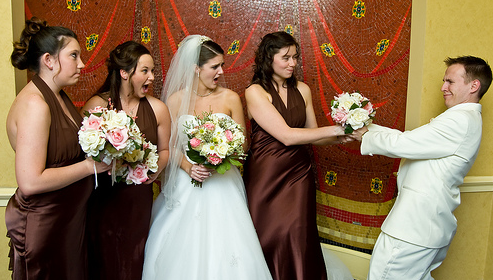
ORIGINALLY PUBLISHED IN THE CALGARY HERALD, MARCH 2005, IN LISA HANSLIP’S COLUMN “I DO, BUT DON’T…”
The long road from happy engagement to wedded bliss is paved with potential etiquette faux pas. Wedding planner Lisa Hanslip is here to help you resist your inner Bridezilla along the way.
Q: I’m having a very hard time choosing a maid of honour. I have a few girlfriends that I’m fairly close to, but my very best friend is a guy. We’ve known each other since junior high – and he’s seen me through everything. Would it be weird to choose him instead of a maid of honour? Should he just dress like the groomsmen? Will I give my grandmother a heart attack?
A: Unconventional, yes! Unexpected, you bet! Acceptable, absolutely!
You want your honour attendant – whether it is a maid of honour, matron of honour or man of honour – to be the person to whom you feel closest. You should choose your best friend, the person you want standing beside you on your big day – not the friend that would look best in the bridesmaid dress.
If you choose a man to be your honour attendant – you may opt to eliminate some of the “typical” duties like hosting your bridal shower, or helping you get into your wedding gown. But the most important part of the job description is being supportive and serving as the legal witness to your marriage.
Choosing your attendants can often be a difficult process – for the bride and the groom. There may be family politics involved. Or, like some, you may have served as a bridesmaid for a dozen of your friends and family members and feel obligated to ask them to stand up for you in return. Well…don’t.
This is your day – and although it is impossible to accommodate everyone’s wishes – you can’t make your choices based on not wanting to offend someone. You can’t make everyone happy – nor can you make everyone your bridesmaid – so just choose those you are currently closest to. You can always assign tasks – like doing a reading or taking care of the guest book – to those you want to feel special and included in your wedding but aren’t in the bridal party.
When you decide on the attire for your attendants, he can wear a suit or tuxedo and coordinate his tie to the other bridesmaids. This scenario also holds true for the groom. It is also perfectly acceptable to have a woman be the best “man.” A best “woman” looks great in a black strapless gown to coordinate with the other groomsmen.
So, feel free to choose your best guy friend or brother to stand up for you at your wedding. Just keep your “man of honour” away from the lavender chiffon and size 11 purple pumps – and your grandmother’s heart should be just fine!
{ seven brides(maids) for…two groomsmen }
Thursday, April 12th, 2012 | etiquette, Q&A | No Comments
ORIGINALLY PUBLISHED IN THE CALGARY HERALD, SEPTEMBER 2005, IN LISA HANSLIP’S COLUMN “I DO, BUT DON’T…”
The long road from happy engagement to wedded bliss is paved with potential etiquette faux pas. Wedding planner Lisa Hanslip is here to help you resist your inner Bridezilla along the way.
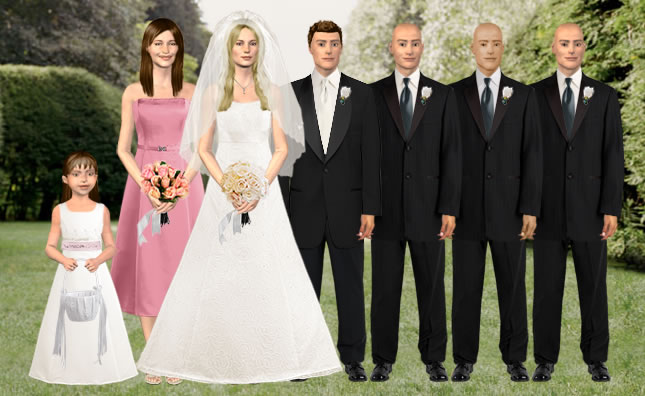
Q. I’m having trouble choosing my attendants (or support team, as I like to think of them). I originally wanted only a Maid of Honour (my sister) without any other attendants. Unfortunately, my fiancé really wants 3 groomsmen and has already asked two of them. So I now feel stuck. I’ve narrowed it down to 4 people (one is a guy) for two spots. Two are a husband and wife. He and I have been through a lot together and have known each other much longer than his wife and I, but she has become a good friend too (and I was a bridesmaid at their wedding so I feel obliged to include her). The other two are good friends from when I was in school. How does one make this decision? Please help.
A. Choosing attendants seems to fall into two categories: it’s either easy and clear cut – you have three sisters, you have a tight knit group of four that you’ve known since childhood, you have one sister and your fiancé has one brother, etc. – or, more likely, the whole idea of having to choose more than one, but less than 12, bridesmaids is more challenging than an advanced Sudoku puzzle.
Countless brides juggle choosing who they really want vs. who they feel obliged to ask, simplicity vs. having everyone you know in a matching dress at the front of the church with you…it’s rarely easy.
Just because you were a bridesmaid at someone’s wedding, does not mean you have to ask them to be your bridesmaid in return. Some women have had the (un)fortunate experience of being a bridesmaid a dozen or more times – it would be completely impractical to reciprocate. Sometimes it’s a case of – if you ask Sally, Jane will be upset, and vice versa, so you need to ask both or neither.
You could still make your friend’s wife feel included by asking her to be an usher, or do a reading during the ceremony. However, this depends a lot on her personality. You don’t want your wedding to be a cause of strife in their marriage – so if you really want him as an attendant – and you think she’d be completely insulted to be left out – then ask them both and get your other two friends to participate in some other way.
The other option is to avoid the whole mess by doing what you had originally planned – just ask your sister to be your Maid of Honour and leave it at that (don’t worry about it looking slightly lopsided).
When all is said and done, it is your day, and you should have the “support team” you want, not the one you felt obligated to have.
{ this is not your mother’s wedding…literally…}
Friday, April 6th, 2012 | etiquette, Q&A | No Comments
ORIGINALLY PUBLISHED IN THE CALGARY HERALD, AUGUST 2005, IN LISA HANSLIP’S COLUMN “I DO, BUT DON’T…”

Q. We’ve recently started planning our wedding and it seems like everyone has an opinion about how everything is supposed to be done. No one really agrees which one is the “right” way, but I’m fairly certain a lot of them are definitely the wrong way. I really like my future in-laws, but their ideas are making me cringe. I don’t want to offend them – but how do I tell them that their plans are way off base?
A. Getting everyone to agree on details when planning a wedding can often require more tact and patience than a UN peacekeeping summit. You want to make sure that you’re following protocol, and do not offend your guests. However, while you are planning your wedding you are also establishing a relationship with your future in-laws and don’t want to cause hard feelings that may still be lingering when it comes time to plan your 25th anniversary party.
If the details in question are small (your future mother-in-law wants programs that include all the readings for your ceremony and you don’t), the best idea is to let them go – by letting her take charge of something you don’t care too much about – it might take the attention off a more contentious issue. If they’re a big deal like she is determined your wedding colours should be purple and green (or some other combination you find equally distasteful), or she decided she didn’t get to invite enough people and has had her own invitations printed (even though you’ve already invited more people than the venue will hold) – then something should be said – but not by you. It will make for far less hurt feelings to always have your fiancé deal with issues involving his family, and you with yours (bringing in those UN peacekeeping forces might be a wise idea also).
Here are a few tried and tested rules of etiquette that will help the bride and groom, their families and the guests from pulling their (or anyone else’s) hair out:
• The mother of the bride or mother of the groom should never host the bridal shower.
• Don’t invite 400 people if you can only afford to host 100 – and similarly don’t invite throngs of people you know cannot attend in hopes they’ll send a gift.
• Make sure your guests feel welcome – think about details like parking and dietary restrictions – and don’t expect them to pay for anything at your wedding.
• Don’t refer to gifts or gift registries with the wedding invitations; however it is ok in the bridal shower invitations as the bride or bride’s family is not hosting (see above).
• The rules of “who pays for what” are traditional – but don’t be unreasonable: don’t ask the groom’s family for money – but don’t be shy about discussing the realities of the financial situation and accepting help or to split costs.
• The bride and groom must send a written thank-you note for every gift (yes, even those crocheted place mats!) – and do so in a timely manner – aim to get them out in a month – but absolutely no later than three months after the wedding.
Good luck with your in-laws…but don’t let anyone make you lose sight of the fact that the day is about you and your fiancé…enjoy!
{ my two dads }
Friday, March 30th, 2012 | etiquette, Q&A | No Comments
ORIGINALLY PUBLISHED IN THE CALGARY HERALD, JUNE 2005, IN LISA HANSLIP’S COLUMN “I DO, BUT DON’T…”
The long road from happy engagement to wedded bliss is paved with potential etiquette faux pas. Wedding planner Lisa Hanslip is here to help you resist your inner Bridezilla along the way.
Q. I’m getting married in the fall. All the details seem to be coming together nicely except there’s one big problem…My parents divorced when I was eight and my mom re-married shortly after. My step-dad is wonderful and has always basically been the father figure. I am still quite close with my father, though, and I know either would be very disappointed about not walking me down the aisle. What should I do?
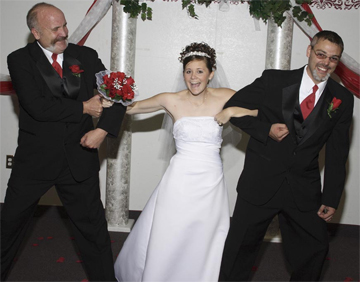
A. Hmmm…yes…this is always a very sticky situation when a bride is close to both her father and step-father. Unfortunately, there is never a clear-cut, one-size-fits-all, answer. How you choose to handle this is entirely dependant upon the personalities involved.
If you are very close with both men, etiquette states it is your natural father that should walk you down the aisle. For many brides, though, their step-dad has been so much more involved in their daily lives that it seems an automatic choice to ask him in lieu of their biological parent.
If both men get along and are amiable with each other you can choose to have both of them walk you down the aisle. Strictly speaking, this is a total no-no. However, unless Emily Post (or Dr. Phil) will be onsite to help smooth the ruffled feathers of the “dad” who does not get to walk you down the aisle – this is certainly a viable option. You could either have one escort on either arm, or have your father take you half way, and your step-father the other half. Another option is to choose your natural father to walk you down the aisle, and your stepfather for the father-daughter dance (or vice versa).
The only other option would be to avoid the situation altogether and walk down the aisle alone. From an etiquette perspective, this is a more appropriate compromise than, say, having your mom walk you down the aisle, and can potentially alleviate any hurt feelings. If you’re really worried about it, pick a ceremony venue that has a very skinny aisle (or a ridiculously pouffy dress). Then you can look your dad(s) in the eye and say with confidence…I’m so disappointed, there’s simply not room for anyone beside me. If you opt to go it alone, you could briefly pause to hug them both, and then have your fiancé escort you the last few feet.
It is wonderful to want to observe all the proper etiquette at your wedding…just don’t forget about the potential lifetime of angry glances over the Thanksgiving turkey before you make your final decision.
Lisa Hanslip is a Calgary wedding planner (www. askaweddingplanner.com). Her advice appears regularly on the Love Stories pages.
{ receiving line…yay or nay? }
Saturday, March 10th, 2012 | etiquette, media, Q&A | No Comments
ORIGINALLY PUBLISHED IN THE CALGARY HERALD, APRIL 2005, IN LISA HANSLIP’S COLUMN “I DO, BUT DON’T…”
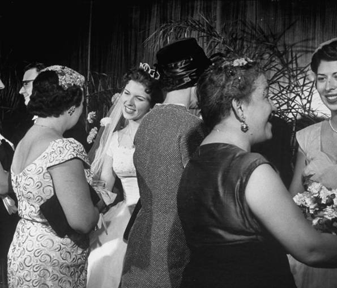
The long road from happy engagement to wedded bliss is paved with potential etiquette faux pas. Wedding planner Lisa Hanslip is here to help you resist your inner Bridezilla along the way.
Q: We’ve been told we need to have a receiving line at our wedding – but we don’t really know when it is supposed to be or even who exactly is supposed to be included – do we really need to have one?
A: Traditionally, it is considered proper etiquette to have a receiving line at any wedding with more than 50 guests. The purpose of the receiving line is to give the hosts and the happy couple an opportunity to personally greet each guest.
The receiving line usually starts with the parents of the bride, followed by the groom, the bride, the parents of the groom, and sometimes the maid of honour. The groomsmen do not participate in the receiving line nor do the bridesmaids (hmmm…eight attendants and 250 wedding guests…we might get to sit down for dinner sometime before their first anniversary).
Today, it is perfectly acceptable not to have a receiving line. If you’re planning to invite enough people to fill all four halls of the Round-Up Centre – it is probably best to skip it. But, if you’ve invited less than 200 people, it can certainly be manageable – and useful: If even your best party-mingling efforts don’t allow you to visit with each guest during the reception – you can relax knowing you spoke with everyone during the receiving line.
The receiving line can be held at the church as people exit or at the reception as people enter. It can be a great way to usher people out of the ceremony or into the reception – but allow enough time so you’re not impinging on your time for wedding photos or the start of dinner. The receiving line can be rather a lengthy process – so count on at least half an hour to greet all of your guests – closer to an hour if you have lots of chatty relatives to contend with.
Just remember – whether or not you have a receiving line – the important thing is that you greet each and every guest and thank them personally for sharing in your big day. If you decide to go for it – make sure your comfy shoes and bottle of Purell are at the ready – and you’ll be all set.
Lisa Hanslip is a Calgary wedding planner (www. askaweddingplanner.com). Her advice appears regularly on the Love Stories pages.
hmm…our venue is on fire…isn’t that delightful!?!
Thursday, February 23rd, 2012 | etiquette, Q&A | No Comments
ORIGINALLY PUBLISHED IN THE CALGARY HERALD, MAY 2005, IN LISA HANSLIP’S COLUMN “I DO, BUT DON’T…”

Q. Our wedding is a few weeks away and our reception venue just had a big fire. Although we had our hearts set on this location, we decided to book another place close by instead of waiting for the repairs to be completed. What is the proper way to inform our guests? Can we just tell everyone at the ceremony?
A. All sorts of things can pop up (or burn down) when planning a wedding. The venue can double book, the church can flood, the photographer can unexpectedly choose another occupation (what do you mean you’ve really always wanted to be a plumber?), or there can be a family emergency requiring a postponement. Whatever the scenario, it is not uncommon for something to instigate either a change of date or a change of venue.
Typically, the appropriate etiquette to handle a change of wedding details is mailing the new details to your guests. Either a hand written note or a simple card – printed to match your invitations – is acceptable.
Had you decided to postpone your wedding the same rules would apply. It is the top priority to inform your guests if there is a major change – such as a change of date or a change of locale. Every wedding usually has at least a few guests coming from out of town – they’ve graciously taken time off work and made travel arrangements. Your local guests may have arranged baby sitters or transportation. Make sure you tell them…post haste!
With so little time before your wedding date I suggest using the telephone. Although your new venue is nearby, it is courteous to let your guests have some warning. A reminder at the ceremony – either printed on the programs or with a verbal announcement – is always a good idea. However, there are inevitably always a few guests that don’t make it to the ceremony (I told you it was left on Main Street), and even more guests that don’t bother reading the programs (Oh, doesn’t she look beautiful, I wonder what I’ll look like on my wedding day…).
So, enlist your family and your bridesmaids to help you man the phones. Then, take a deep breath and relax (having a fire extinguisher at the ready couldn’t hurt either!). Well done finding a new reception venue so quickly – your wedding will be smooth sailing.
the etiquette of gift registries
Saturday, January 21st, 2012 | etiquette, Q&A | No Comments
ORIGINALLY PUBLISHED IN THE CALGARY HERALD, FEBRUARY 2005, IN LISA HANSLIP’S COLUMN “I DO, BUT DON’T…”

Q: We recently went to register for our wedding and the store clerk offered us registry enclosure cards to include in our invitations. Is this acceptable? We were also a bit unsure what to register for. Help!
A: No, no, a thousand times, no! It may seem helpful, but it is never acceptable to enclose a registry notice or gift wish list with your invitation. Never. Ever.
One of the major etiquette dangers is the method of informing your guests about your registries. The stores themselves help perpetuate this etiquette no-no by offering you the offensive invitation enclosures.
Your gift registry can be one of the most fun aspects of planning your wedding (”Here, honey, just point this gun at things and voila, they’re on our wish list!”) but it can also prove to be an etiquette minefield.
The first major issue is the registry itself. Today’s engaged couples often have established households of their own, so a registry is an excellent way for your guests to know what you actually need (Oh look! Another toaster! Everyone needs four toasters, don’t they?). Make sure you think carefully about what you actually need and make a wish list that is agreeable to both you and your partner.
Your guests have different budgets, so register for items in a variety of price ranges. You cannot expect all of your guests to spring for that $400 food processor, or that they will be happy buying you one teaspoon because at $100 a piece it is the only thing on your registry they can afford. A thoughtful gift registry gives everyone the opportunity to buy you something you will love.
These days, it is also perfectly acceptable to register for nontraditional items such as hardware, sporting goods, charitable donations, or, yes, even the honeymoon. Keep in mind, though, that although lifestyle gifts are appropriate, some people are going to prefer giving you something tangible.
You may prefer to receive money, which is traditional in many cultures, or contributions to your honeymoon fund, but you cannot tell your guests what to give you. It is just not polite to request gifts of ANY kind. Giving a wedding gift is the socially acceptable thing to do – but no one is really obligated to buy you a gift. Informing your guests what kind of gift you would like at the same time you are inviting them to your wedding is like telling them the gift is more important than their attendance.
The way to let people know where you’re registered is via word of mouth.
Make sure your bridal party and family know where you are registered or if you have a preference for a more non-traditional gift. Then you have to wait until someone asks where you are registered, and just cross your fingers!
7 Relationship Mistakes Even the Smartest Couples Make
Wednesday, September 28th, 2011 | Q&A, Uncategorized | No Comments
I always believe it is important to discuss things with your future spouse before they become an issue…less chance for a heated argument – and more opportunity to discover where you’re both coming from. My husband & I sometimes teach marriage prep classes so I’m a big believer in discuss, discuss, discuss….but just in case you haven’t discussed…here are some helpful tips from our friends at thenest.com:

Mistake #1: Not Dealing With Debt
Newsflash: Money is the #1 thing couples fight about. Fess up about your personal debt — because for better or worse — and then set up a financial game plan.
Mistake #2: Alienating Your Friends
Friends are key for a successful marriage, so tag along on those girls’ nights out. Just because you’re not guy-hunting doesn’t mean you can’t be a supportive wingwoman.
Mistake #3: Not Having Enough Sex
Over 60 percent of newlyweds we surveyed were already in a sex rut! Yeah, you’re busy, but that’s not a good enough excuse not to get busy. Initiate sex, even if you don’t feel like it or have to schedule it. If you get in the habit of having it, you’ll start wanting it (and liking it) more.
Mistake #4: Letting Yourself Go
So you put on the “newlywed nine.” Big whoop…you’ve already found your mate, right? Wrong! Make a plan to get fit together or at least respect each other’s goals.
Mistake #5: Outlawing the In-Laws
Fifty percent of couples we surveyed have a problematic relationship with their in-laws (ya think?). Manage expectations, like saying you’ll call on Sundays so his mom doesn’t guilt-trip you for ignoring her weekday messages. Even if your spouse is bitching about his family, resist the urge to chime in. It’ll bite you in the butt later.
Mistake #6: Crazy Fighting
Getting hitched isn’t a free pass to hit below the belt (sorry!). When you’re getting really heated, walk away to cool down for a few minutes.
Mistake #7: Becoming Baby-Obsessed
It’s easy to fixate on that next big step, but chill out — the average couple has a kid within three years of marriage. So really, why rush? Savor the moments (and vacations you can take!) now…when you won’t have to be waking up for a brutal 4 a.m. feeding.
{ ask the expert }
Thursday, August 4th, 2011 | etiquette, media, Q&A | No Comments
Originally published in Weddings in Alberta Magazine, August 2011.
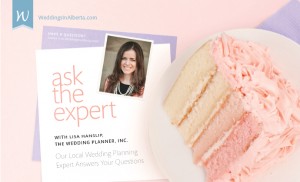
We have a lot of guests traveling from out of town for our wedding. What are we expected to pay for? How involved should we be in the planning of their stay?
Some couples make the decision to factor their out-of-town guests’ hotel rooms into their budget (or all of their guests’ rooms if they’ve chosen an out-of-town venue), but for the vast majority of couples, this is not common. You should absolutely arrange for a block of rooms with a good room rate at one or more hotels, but you are not obligated to pay for their rooms.
You should also put some time and effort into making your out-of-town guests feel welcome: provide a list of suggested of activities in town, perhaps a welcome bag for their hotel rooms (even something as simple as a bottle of water, snacks and a little note is always very much appreciated), and if possible, invite your out-of-town guests to the rehearsal dinner and/or the day-after brunch.
We are not having a wedding party for our very intimate day. What should we do with the rings and who should hold my bouquet during the ceremony?
Intimate weddings are just lovely—there’s no need to worry about not having a wedding party. Your officiant can take your bouquet from you at the appropriate moment and set it down on the altar or signing table and you can retrieve it after you’ve done the signing so you’ll have it for your recessional back down the aisle. As for the rings, you have a couple of choices: either give them to the officiant before the ceremony or your fiancé can put them both in his pocket and hand them to the officiant during the ceremony.
We’ve had a major misunderstanding with our caterer, and now they are no longer in our budget. What do we do?
First, check your contract to see if your deposit is refundable or if it is even possible to cancel your contract (this usually depends on the amount of time until your date: is your wedding still a year away or is it next weekend? Typically the nearer your date, the less flexibility you’re going to have in the contract). If there’s no time to find another caterer or if you’re locked into your contract (or you can’t afford to give up your deposit), you’ll need to take a deep breath and adjust the vision for your reception.
Perhaps you can eliminate a course (or two) to get the costs back in your budget range. If it really was a major misunderstanding and it is not feasible to hire another caterer to take over, you might need to go so far as changing your reception from a sit-down dinner to a cocktail reception. If you do change from a sit-down to a cocktail reception, make sure to alter the start time of your reception so your guests won’t be expecting a full meal.
If you are able to get your deposit back and get out of your contract with your caterer, find your way to a more affordable caterer (ask your other vendors and talk to other brides for recommendations), but make sure to do a tasting and be very clear about your expectations and compare it to what they’re able to deliver before you commit to anything.
If none of these options is viable, you really only have one other alternative (if your invitations haven’t gone out yet): you’ll have to cut your guest list to a number that will make your caterer fit in your budget. This can be difficult and fraught with familial discord, but you need to pick an option that won’t break the budget while still allowing you to enjoy your big day. Whatever you decide…good luck and bon appetit!
We’re not sure if we want to do a cake cutting and all that goes with it. Why do couples cut the cake and feed it to each other?
The wedding cake dates back to Roman times when the cake was actually part of the ceremony. The customs and symbolism surrounding the wedding cake have morphed—sometimes rather unpleasantly (breaking the cake over the brides head anyone?)—over the years, but now the cutting of the cake symbolizes the first task the bride and groom complete as a married couple.
Many couples include the cake cutting purely for the photo op and the enjoyment of their guests. It’s always a favorite moment for guests to take a pic of the happy couple. Feel free to skip the “feed it to each other” part unless you have a burning desire to do so. Have your photographer or planner tell you the best angle for your photo op: both of you hold the handle of the knife and make a cut in the bottom or middle layer. When you’ve completed the cut, keep your hands on the knife, look up and smile—you’ll probably need to hold the pose for several minutes while all the guests get their photos.
Even if you plan to have cupcakes or macarons instead of a cake, it’s nice to have a small cake so you can make the ceremonial cut. However, there’s no reason you have to have a wedding cake at all – perhaps your venue is known for a particularly fabulous type of dessert which you’d rather serve your guests. But if you do decide to have the wedding cake your guests will expect you to cut it…let them cut cake!

Categories
Archive
- October 2014
- July 2014
- June 2014
- December 2013
- July 2013
- March 2013
- October 2012
- September 2012
- August 2012
- July 2012
- June 2012
- May 2012
- April 2012
- March 2012
- February 2012
- January 2012
- November 2011
- September 2011
- August 2011
- July 2011
- June 2011
- May 2011
- April 2011
- March 2011
- February 2011
- January 2011
- December 2010
- November 2010
- October 2010
- September 2010
- August 2010
- July 2010
- June 2010
- May 2010
- April 2010
- March 2010
- February 2010
- January 2010
- December 2009
- November 2009
- October 2009
- September 2009
- August 2009
- July 2009
- June 2009
- May 2009
- April 2009
- March 2009
- February 2009
- January 2009
- December 2008
Meta
Search



